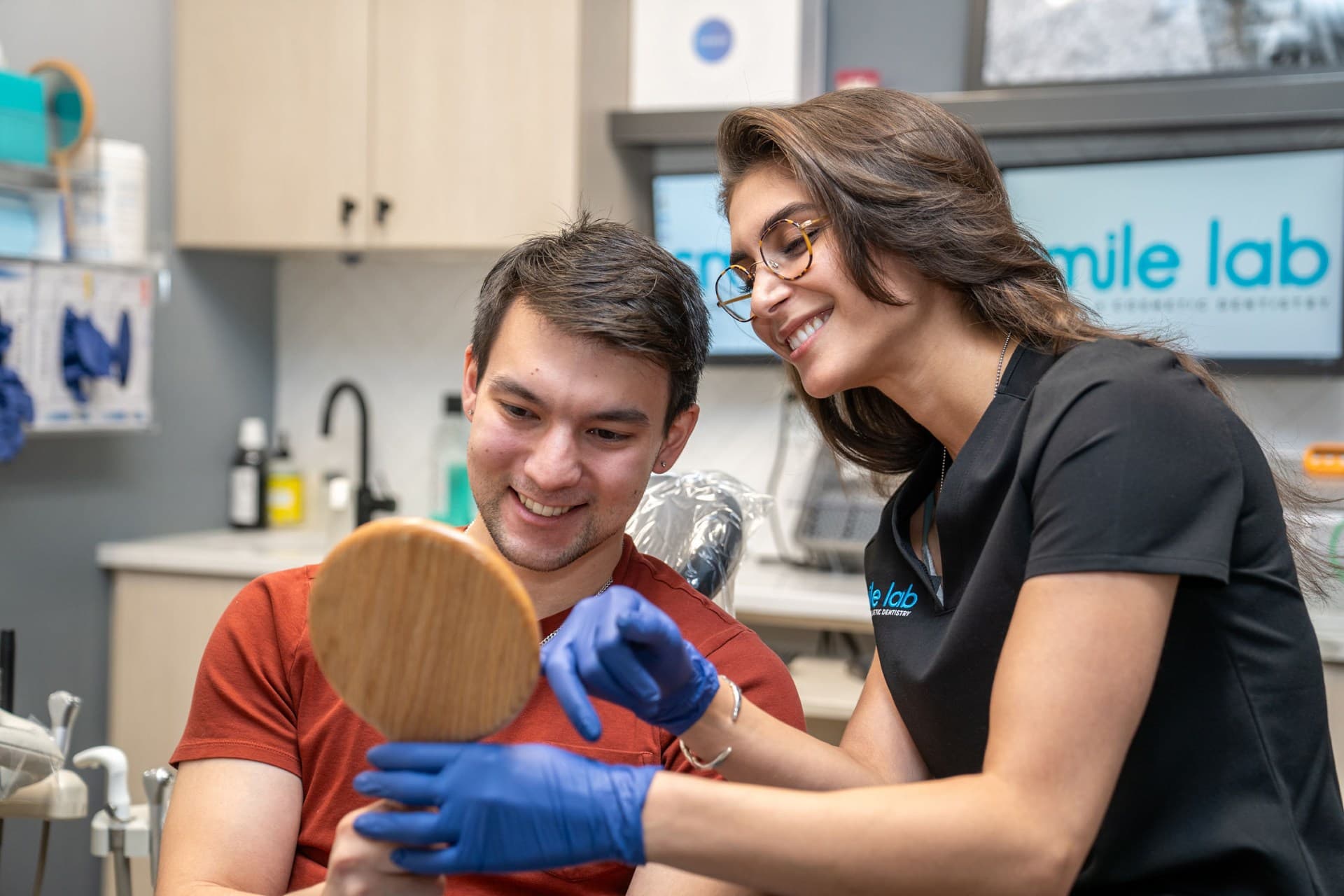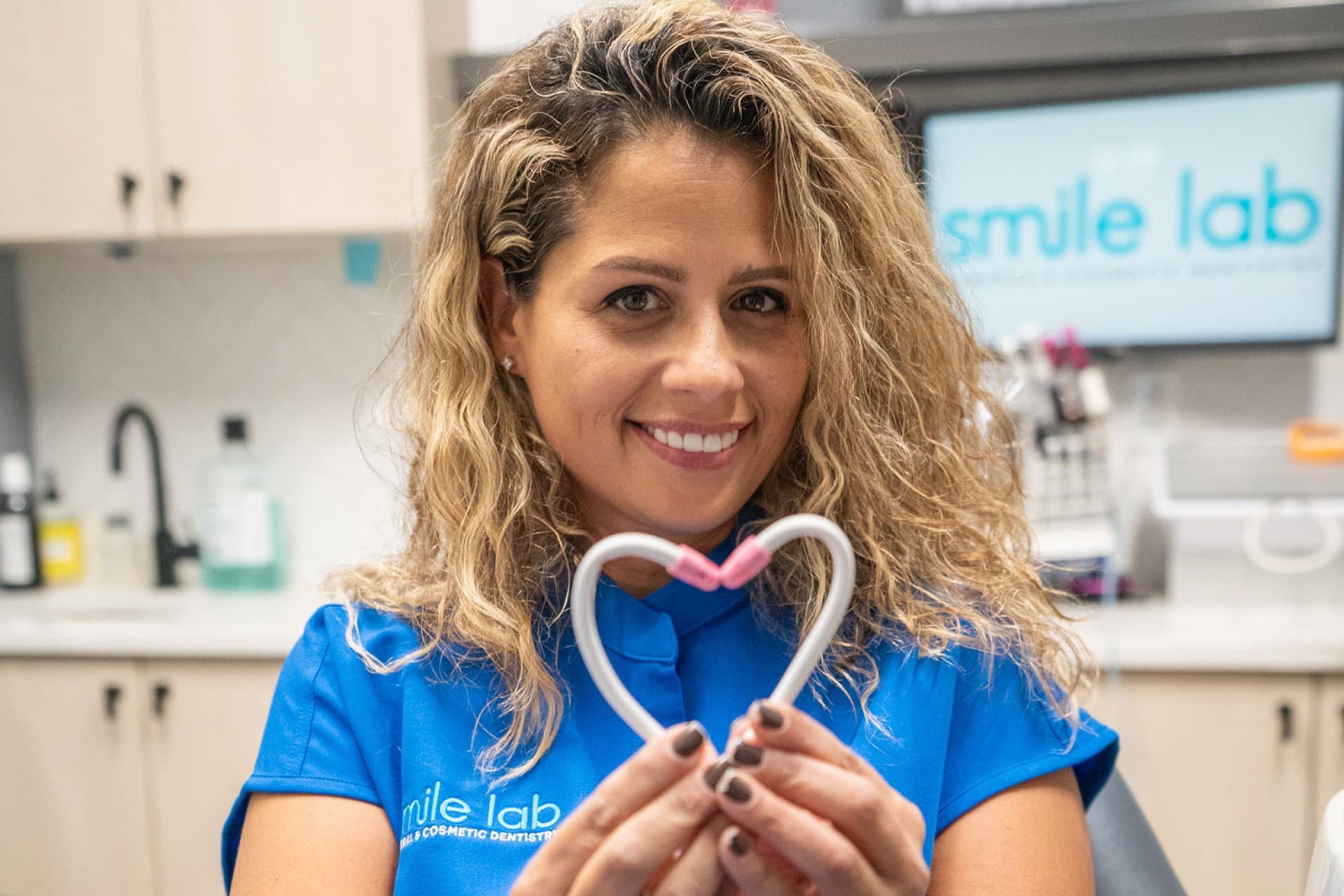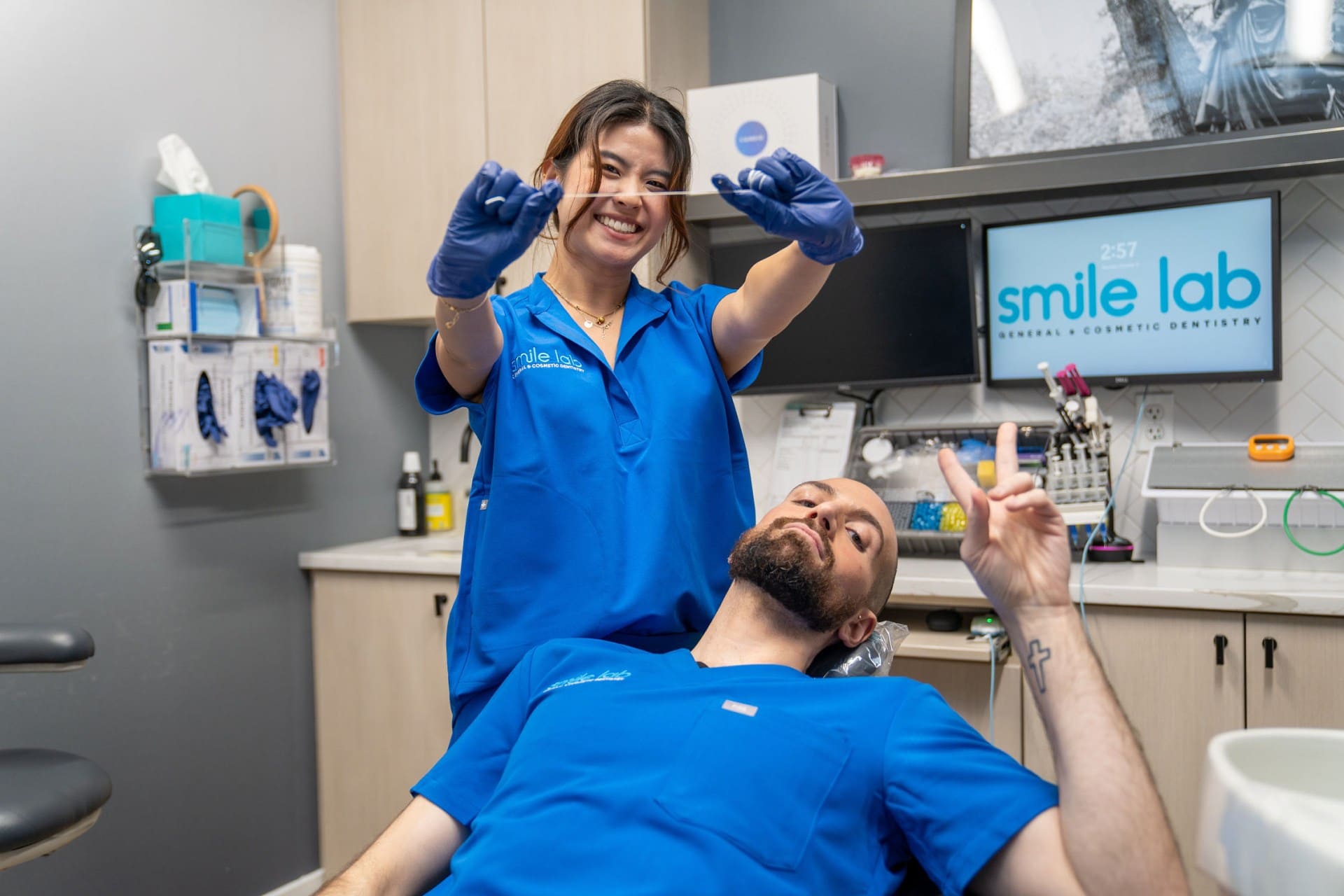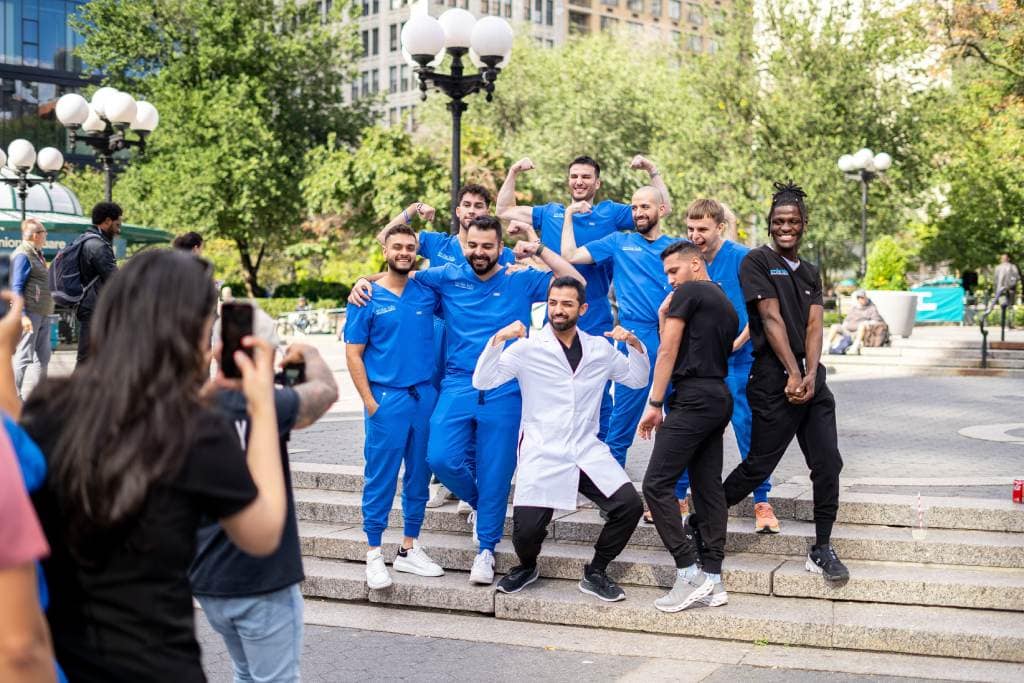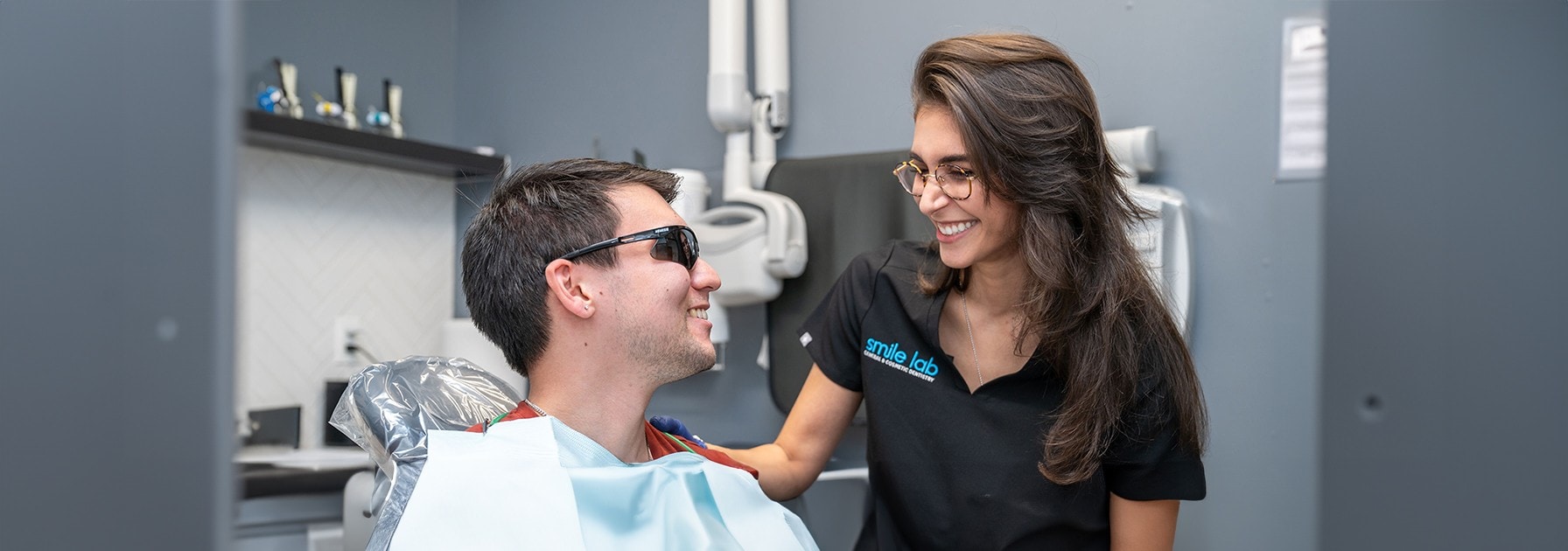Exams & Cleanings
Step into a brighter smile with Smile Lab in New York, NY. We firmly believe that regular dental exams are essential for maintaining a vibrant and healthy smile. Our preventative exams and cleanings have been designed with this key principle in mind.
Imagine being able to prevent dental issues before they even start. That’s the power of regular preventative exams. Our expert team conducts thorough check-ups of your teeth, gums, and mouth using state-of-the-art technology. This allows us to identify potential issues early, saving you from discomfort and costly treatments in the future.
But our service doesn’t stop at detection. It’s about maintaining a clean and bright smile too. Despite your best efforts, regular brushing doesn’t remove all plaque and tartar build-up, so that’s where we come in. Our professional cleanings ensure that every nook and cranny of your mouth is completely clean, leaving your teeth feeling fresh and smooth.
Consider the peace of mind you’ll have, knowing that you’re taking proactive steps to maintain your dental health. With our exams and cleanings, you’ll walk out of our office with a newfound confidence in your smile.
At Smile Lab, we’re committed to delivering excellent care. We utilize the latest techniques combined with state-of-the-art equipment to ensure your comfort and satisfaction during each visit.
Take control of your dental health today. Prioritize prevention and experience the transformative effect it can have on your oral health. Request your routine appointment with Smile Lab in New York, NY, and let us guide you on your journey toward a healthier and happier smile.
Sedation Dentistry
Anxiety and fear can get the best of us and research shows that over 60% of Americans have some level of dental anxiety. We believe anxiety should not get in the way of you receiving proper dental care. That’s why the team at Smile Lab has various sedation dentistry techniques for any patient who may find receiving dental care a stressful experience. Whether you need a mild sedative or a state of deep relaxation, our specialists can find the right treatment for you. Don’t put off getting that toothache looked at any longer. Request an appointment at our conveniently located New York, NY office today!
Nitrous Oxide
Also known as laughing gas, nitrous oxide produces a mild sedative effect. Unlike with other sedatives, you won’t have any short-term memory loss, just a feeling of calm and well-being while under treatment. Laughing gas is inhaled through a mask and takes effect right away. Plus, the nitrous oxide does not put you to sleep, so you can hear and respond to any of the dentist’s questions or instructions.
Our specialized team is on hand to administer the gas, carefully monitoring the amount you receive. Once you have finished treatment, the effects of the gas dissipate, allowing you to go about your day without any adverse reactions.
Oral Sedation
Oral sedation puts you in complete control of the level of sedation you would like to achieve. This sedation is often in pill form and produces a mild to moderate effect, allowing the patient to relax while in the dental chair.
Oral sedation makes you quite groggy, and you may even fall asleep. But you’ll still be able to communicate with your dentist if necessary, and you’ll awaken with a gentle nudge. Because oral sedation temporarily affects your memory and motor skills, you’ll need a friend or family member to drive you home after your procedure.
IV Sedation
IV sedation gives a deeper level of sedation than oral or nitrous oxide sedation and is the best option for those who are extremely anxious undergoing an oral surgery procedure. Some benefits of IV sedation include:
- No Memory of the Procedure — Most patients fall asleep and have little to no memory of their treatment when they wake up.
- No Sense of Time — You may feel as though the procedure lasted no time at all.
- No Anxiety During Treatment — You feel a deep sense of relaxation with IV sedation.
Throughout treatment, you will be monitored closely by a trained specialist so you can be sure that you are completely safe. This form of sedation can leave you drowsy afterward, so please have someone available to drive you home after your procedure.
Nitrous Oxide
Also known as laughing gas, nitrous oxide produces a mild sedative effect. Unlike with other sedatives, you won’t have any short-term memory loss, just a feeling of calm and well-being while under treatment. Laughing gas is inhaled through a mask and takes effect right away. Plus, the nitrous oxide does not put you to sleep, so you can hear and respond to any of the dentist’s questions or instructions.
Our specialized team is on hand to administer the gas, carefully monitoring the amount you receive. Once you have finished treatment, the effects of the gas dissipate, allowing you to go about your day without any adverse reactions.
Oral Sedation
Oral sedation puts you in complete control of the level of sedation you would like to achieve. This sedation is often in pill form and produces a mild to moderate effect, allowing the patient to relax while in the dental chair.
Oral sedation makes you quite groggy, and you may even fall asleep. But you’ll still be able to communicate with your dentist if necessary, and you’ll awaken with a gentle nudge. Because oral sedation temporarily affects your memory and motor skills, you’ll need a friend or family member to drive you home after your procedure.
IV Sedation
IV sedation gives a deeper level of sedation than oral or nitrous oxide sedation and is the best option for those who are extremely anxious undergoing an oral surgery procedure. Some benefits of IV sedation include:
- No Memory of the Procedure — Most patients fall asleep and have little to no memory of their treatment when they wake up.
- No Sense of Time — You may feel as though the procedure lasted no time at all.
- No Anxiety During Treatment — You feel a deep sense of relaxation with IV sedation.
Throughout treatment, you will be monitored closely by a trained specialist so you can be sure that you are completely safe. This form of sedation can leave you drowsy afterward, so please have someone available to drive you home after your procedure.
Tooth Extractions
Our goal is to preserve your natural smile, but sometimes, a tooth is beyond repair and the best solution for your health is to remove it. From overcrowded wisdom teeth to severely decayed teeth, we provide our patients with safe, emphatic, and pain-free tooth extractions. We know how important your teeth are not just for your appearance but your overall health, that is why once your tooth extraction has been successfully completed, we can help find you the perfect solution to replace your missing tooth and have you back smiling!
The reasons for tooth extraction can vary, but this solution is used only when the tooth cannot be saved or restored with another treatment. Tooth extraction may be necessary if:
- Decay or infection has reached the surrounding tissue and inside of the tooth.
- A severely broken, chipped, or cracked tooth caused by trauma or injury may have to be fully removed.
- There are too many teeth in one area of the mouth, causing overcrowding and major alignment issues.
Tooth extractions can be broken up into two categories:
- Simple Extraction — This can be the removal of a tooth that is easily visible and needs to be extracted due to damage or decay. The dentist will numb the area and loosen the tooth (if it needs to be loosened) with a dental instrument called an elevator before removing it with forceps. A simple extraction is typically done within one visit.
- Surgical Extraction — This procedure is slightly more complex. This type of surgery is typical with teeth that may have been broken or have not erupted, such as wisdom teeth. The dentist may have to make an incision in the gum line and extract the remaining or hidden tooth.
Our team of dentists is always on hand to help you with any questions you may have about tooth extraction.
Periodontal Therapy
Periodontal disease, commonly known as gum disease, is the number one cause of tooth loss in adults today and although severe cases are not curable, they can be managed. Periodontal disease can be particularly devastating as it can progress with little to no signs or symptoms. Not only can gum disease affect your mouth, but bacteria can enter your bloodstream and affect the body.
Regular dental check-ups, cleanings, and good oral hygiene practices are key for managing and treating gum disease.
Gum Disease Treatment
While gum disease can be present without any signs, you can also have bleeding when brushing your teeth or dull pain in the gums. These symptoms may mean periodontal disease is present, which one of our dentists and the hygiene team can quickly diagnose. We will start by assessing the shape, texture, and depth of your gums, as well as any teeth movement or bleeding upon examination. Digital X-rays can help us see the bone density around your teeth, giving us a clear insight into your oral health.
Once we have established the severity of the disease, we can start to curate a treatment plan to cater to your individual needs. If caught early, it is possible to treat the disease with one or two deep cleanings and a daily oral hygiene and maintenance plan. If the disease has progressed, the aim will be to stop further deterioration. You will be asked to visit our clinic to deep clean each area and polish the teeth to prevent further decay. Root planing and scaling may also be needed.
Dental Implants
Tooth loss can happen for a variety of reasons, such as decay, injury, or gum disease. While it is always our aim at Smile Lab to make the most of your natural teeth, sometimes a replacement tooth is needed. Luckily, our team of dentists has specialized in restorative dentistry, so we can have your smile looking brand new.
Dental implants have gained popularity as an excellent choice for replacing missing teeth. Their durability, natural appearance, and functionality are just a few of their remarkable features. These implants consist of a titanium post that is surgically placed into the jawbone, mimicking the root structure of a natural tooth. Following the healing process, a custom-made crown is affixed to the post, providing a replacement tooth that seamlessly blends in with your natural smile.
One of the key advantages of dental implants is their ability to stimulate bone growth, effectively preventing the bone loss commonly associated with missing teeth. Not only does this preserve your facial structure, but it also ensures a stable foundation for the implant, keeping it securely in place.
At Smile Lab, our team of highly skilled professionals utilizes the latest techniques and top-quality materials to deliver the best possible outcomes for our patients. We work closely with you to design a dental implant that perfectly matches the color, size, and shape of your existing teeth, resulting in a flawless enhancement to your smile.
Whether you need a single-tooth replacement or a complete set of teeth replacements, dental implants provide a robust and long-lasting solution that improves your oral health and boosts your confidence.
Experience the exceptional care and expertise of Smile Lab in New York, NY, and let us help transform your smile with our state-of-the-art dental implant services.
Root Canals
Our mission is to prioritize the preservation of your natural teeth whenever possible. To achieve this, our highly specialized team of doctors excels in providing exceptional root canal therapy. This procedure is widely recognized in the dental field and our team is impeccably equipped to alleviate your discomfort and eliminate any potential infection.
Root canals become necessary when untreated decay and bacteria spread extensively. As a result, the pulp inside the tooth becomes affected. Since the pulp houses the nerves, infections often cause significant pain. As this damage occurs internally, it may not be apparent visually. Instead, it manifests through pain and various symptoms including bleeding, swelling, and halitosis.
Our team will begin by removing the damaged pulp from inside the tooth. This may sound painful, but we will use a mixture of anesthetics to numb the mouth and sedation therapy to completely relax you and relieve any pain you may feel. The tooth will be filled and sealed and a filling or crown placed over it to restore the natural structure of your tooth. You may have some slight discomfort and tenderness after the anesthesia wears off, however, this is normal and pain medication can help.
Fillings & Crowns
Fillings and crowns are standard treatments in restorative dentistry, aimed at restoring the function, integrity, and morphology of missing tooth structure. A filling is a way to restore a tooth damaged by decay back to its normal function and shape. It involves removing the decayed tooth material, cleaning the affected area, and then filling the cleaned-out cavity with a filling material.
Crowns, on the other hand, are fixed prosthetic devices cemented onto existing teeth or implants. Unlike removable devices, such as dentures, which you can take out and clean daily, crowns and bridges are cemented onto existing teeth or implants and can only be removed by a dentist. A crown is used to entirely cover or “cap” a damaged tooth. Besides strengthening a damaged tooth, a crown can be used to improve its appearance, shape, or alignment.
Oral Cancer Screening
At Smile Lab, we firmly believe in proactive care and prevention when it comes to oral health. This is why we highly recommend routine oral cancer screenings for all of our patients. Oral cancer is an often overlooked form of cancer, but just like other types of cancers, early detection can significantly increase your chances of successful treatment and recovery.
An oral cancer screening is a quick, non-invasive test that we perform during a regular check-up or dental cleaning. This process involves a thorough examination of your oral cavity to identify any abnormal areas that could potentially be cancerous. The examination includes visually inspecting your lips, tongue, cheeks, and the roof and floor of your mouth, as well as feeling your neck and jaw for any unusual lumps.
Oral cancer screenings are crucial for early detection. This is because oral cancer often does not present any noticeable symptoms in its early stages, and by the time symptoms do occur, the disease may have progressed. Regular screenings can help identify oral cancer early when treatment is most effective.
While everyone can benefit from oral cancer screenings, individuals with certain risk factors may need to be screened more frequently. This includes tobacco users, heavy alcohol drinkers, those with a previous diagnosis of oral cancer, and those with a significant amount of sun exposure, which increases lip cancer risk.
If your dentist detects any abnormalities during your screening, you may be referred to a specialist for further testing. However, it’s important to remember that an abnormal finding does not necessarily mean you have cancer. Many oral abnormalities are benign and non-cancerous.
Emergency Dentistry
A dental emergency can refer to a broad range of dental issues from severe pain to a broken tooth, if it is causing you distress then it is important to get the problem fixed straight away. At Smile Lab, we have years of experience in dental care, and with our convenient location in New York, our team is ready to care for any dental emergency you may have.
What Qualifies as an Emergency?
Here are various issues that can be classified as a dental emergency, but broadly speaking, it is anything that is affecting your day-to-day living or putting your oral health at risk. For example, some common dental emergencies include:
- Injuries to the Gums — This can damage your teeth and put you at risk of infection.
- Loose Teeth or Tooth Loss — No adult should lose their teeth. If you have loose teeth or have lost a tooth, see your dentist as soon as possible.
- Abscess — An abscess is a very serious oral issue. If you have a pus-filled pimple along with pain, fever, and gum swelling, please seek urgent care.
- Loose Filling — A loose filling can leave your tooth exposed and at risk of decay or infection.
- Excessive Bleeding — If you are experiencing bleeding gums or bleeding from the mouth that is excessive or worsening, prompt care is needed as it can be a sign of gum disease.
- Knocked-Out Tooth — A knocked-out tooth can be potentially saved if treated quickly.
These are just some of the common dental emergencies that can happen but if you are experiencing any pain, swelling, bleeding, or abnormalities, contact our team today so we can assess the problem and administer treatment if needed.
Why See a Dentist for Emergency Care?
Whether your dental issue requires urgent care or is something that can be resolved within a few days, you should always see a dentist if you notice something wrong. Some problems, like gum disease, can have mild signs such as dull pain, but if left untreated, this can turn into a serious issue, eventually leading to tooth loss. With over 13 years of experience, our lead dentist, Dr. Ebrahimi, has seen and treated many dental emergencies, so however big or small the problem is, remember you are in safe hands at Smile Lab!




